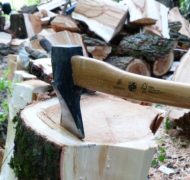Elisha’s Restoration of a Lumberjack’s Axe (2 Kings 6:1-7)
Bible Commentary / Produced by TOW Project
Cutting wood along the bank of the Jordan River, one of Elisha’s fellow prophets loses an iron axe head into the river. He had borrowed the axe from a lumberjack. The price of such a substantial piece of iron in the bronze age would have meant financial ruin for the owner, and the prophet who borrowed it is distraught. Elisha takes the economic loss as a matter of immediate, personal concern and causes the iron to float on top of the water, where it can be retrieved and returned to its owner. Once again Elisha intervenes to enable someone to work for a living.
The gift of a prophet is to discern God’s aims in daily life and to work and act accordingly. God calls the prophets to restore God's good creation, in the midst of a fallen world, in ways that point to God’s power and glory. The theological aspect of a prophet’s work—calling people to worship the true God—is inevitably accompanied by a practical aspect, restoring the good workings of the created order. The New Testament tells us that some Christians are called to be prophets as well (1 Corinthians 12:28; Ephesians 4:11). Elisha is not only a historical figure who demonstrates God’s concern for his people’s work, but a model for Christians today.
Related Content
Popular Content
Popular Content
Table of Contents
- Samuel, Kings & Chronicles and Work
- Introduction to Samuel, Kings and Chronicles
-
From Tribal Confederation to Monarchy: 1 Samuel
- The Calling of Samuel (1 Samuel 1-3)
- The Perils of Treating God Like a Good Luck Charm (1 Samuel 4)
- The Opportunities That Arise From Working Faithfully (1 Samuel 5-7)
- Samuel’s Sons Disappoint (1 Samuel 8:1-3)
- The Israelites Ask For a King (1 Samuel 8:4-22)
- The Task of Choosing a King (1 Samuel 9-16)
- David's Rise to Power (1 Samuel 17-30)
-
The Golden Age of the Monarchy: 2 Samuel 1-24, 1 Kings 1-11, 1 Chronicles 13, 21-25
-
David's Successes and Failures as King (2 Samuel 1-24)
- David’s Rape of Bathsheba and Murder of Uriah (2 Samuel 11-12)
- David’s Dysfunctional Handling of Family Conflict Leads to Civil War (2 Samuel 13-19)
- David Learns He Needs God’s Guidance How to Do His Work (1 Chronicles 13)
- David’s Disobedience to God Causes a National Pestilence (1 Chronicles 21:1-17)
- David’s Patronage of the Musical Arts (1 Chronicles 25)
- Assessing David’s Reign (1 Kings)
- David Prepares Solomon to Succeed Him as King (1 Kings 1; 1 Chronicles 22)
- Solomon Succeeds David as King (1 Kings 1-11)
- Assessing Solomon's Golden Age (1 Kings)
-
David's Successes and Failures as King (2 Samuel 1-24)
-
From Failed Monarchies to Exile (1 Kings 11 - 2 Kings 25; 2 Chronicles 10-36)
- Obadiah Saves a Hundred People by Working Within a Corrupt System (1 Kings 18)
- Ahab and Jezebel Murder Naboth to Get His Property (1 Kings 21)
- The Prophet Elisha’s Attention to Ordinary Work (2 Kings 2-6)
- The Southern Kingdom's March Toward Exile (1 Kings 11:41 - 2 Kings 25:26; 2 Chronicles 16 - 36)
- Rehoboam’s Failure to Tell Good Advice From Bad (2 Chronicles 10:1-19)
- Conclusions from Samuel, Kings, and Chronicles
Related Content
Donate
Bookstore

The Theology of Work Bible Commentary is an in-depth Bible study tool put together by a group of biblical scholars, pastors, and workplace Christians to help you discover what the whole Bible--from Genesis to Revelation--says about work. Business, education, law, service industries, medicine, government--wherever you work, in whatever capacity, the Scriptures have something to say about it. This edition is a one-volume hardcover version.
Bible
Copyright
Contributors: Jill Baker, Brian Housman and Alice Mathews
Adopted by the Theology of Work Project Board June 2, 2014.
Theology of Work Project Online Materials by Theology of Work Project, Inc. is licensed under a Creative Commons Attribution-NonCommercial 4.0 International License. Based on a work at www.theologyofwork.org
You are free to share (to copy, distribute and transmit the work), and remix (to adapt the work) for non-commercial use only, under the condition that you must attribute the work to the Theology of Work Project, Inc., but not in any way that suggests that it endorses you or your use of the work.
© 2014 by the Theology of Work Project, Inc.
Unless otherwise noted, the Scripture quotations contained herein are from the New Revised Standard Version Bible, Copyright © 1989, Division of Christian Education of the National Council of the Churches of Christ in the U.S.A., and are used by permission. All rights reserved.










